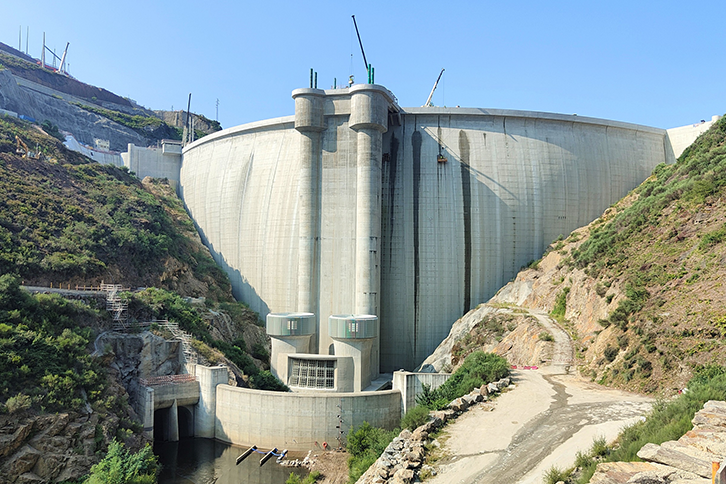News
2023-08-09 10:53:00.0All set to fill in the Alto Tâmega dam
- The river diversion tunnel was closed this July.
- The dam will enter commercial operation in March 2024.
The construction of the Alto Tâmega Hydroelectric Power Plant continues to progress at a good pace. The civil works are practically finished and the electromechanical assemblies will be completed by the end of 2023, when commissioning will begin.
Alto Tâmega, with 160 MW, is the last of the three developments that make up the Tâmega complex. The other two, Gouvães, an 880 MW pumped-storage plant, and Daivões, with 118 MW, have been in commercial operation since 2022.
The Alto Tâmega dam is now fully completed. It is a large, 104.5 m high, 220,000 m3 of concrete and 335 m of crest length, double curvature vault dam.
For constructional and thermal reasons, the concreting of the dam was carried out in 21 blocks, which in turn are divided into 2-metre-high sections. The complete concreting of the dam took less than two years and was completed at the end of 2022.
During this spring, the injection of the construction joints of the dam has been carried out; once the concrete in place has cooled down during the winter and the opening between the joints is larger. In this way, when the gaps between the blocks are filled, the dam acquires its monolithic character and it is possible to start filling.
During this month, the river diversion tunnel has been closed and in the next three months or so, a 28 m long concrete plug will be built inside the tunnel to ensure the closure of the diversion tunnel for the entire life of the facility. During these three months, the flow of the river will continue to circulate through the dam's bottom outlets.
The Alto Tâmega reservoir, which will cover an area of 468 ha and have a volume of 132 hm3, will then be filled, providing the water needed for the production of renewable electricity at the Alto Tâmega power plant at the foot of the dam, which will have two units with a total capacity of 160 MW.
The construction of this large dam, with its hydroelectric plant at the foot of the dam, is the culmination of a great deal of work in design and execution by a large interdisciplinary team at Iberdrola, which has been directly responsible for licensing, planning, engineering, construction supervision, commissioning, environmental matters, relations with the affected entities of the Portuguese State, relations with local communities, execution of affected services and a wide range of other matters, all of which are necessary to build a facility of this magnitude on time and on schedule.
During the construction of the Alto Tâmega Hydroelectric Power Plant, a peak of almost 1,000 workers was reached on site.
In the meantime, the electromechanical assembly of the power plant continues and is progressing smoothly according to schedule. The turbines of both units are already fully assembled and the generators are at a very advanced stage of assembly. Once the reservoir has been filled this winter, the first synchronisation of one group to the grid is scheduled for January 2024 and the plant will enter commercial operation in March 2024.
It should also be noted that the creation of the Alto Tâmega reservoir has involved, among other things:
- Replacement of affected services. Among others, two bridges of approximately 150 m length each, 16 km of access roads, a 9 km footpath, 4 km of power lines, 5 km of telephone lines, the adaptation of a sewage treatment plant, etc.
- Compensation measures for ecological systems, framed in the project's EIS. Examples of these measures are the reforestation of more than 1,000 ha, the planting of 17,000 cork oaks, actions to improve the populations of protected flora and fauna, etc.
This has been made possible through close and constant collaboration with national and municipal authorities, local communities and other state entities involved.
The Tâmega hydroelectric complex is one of the largest energy initiatives in Portugal's history, with a total investment of more than €1.5 billion and an installed capacity of 1,158 MW, 880 of which are reversible.







